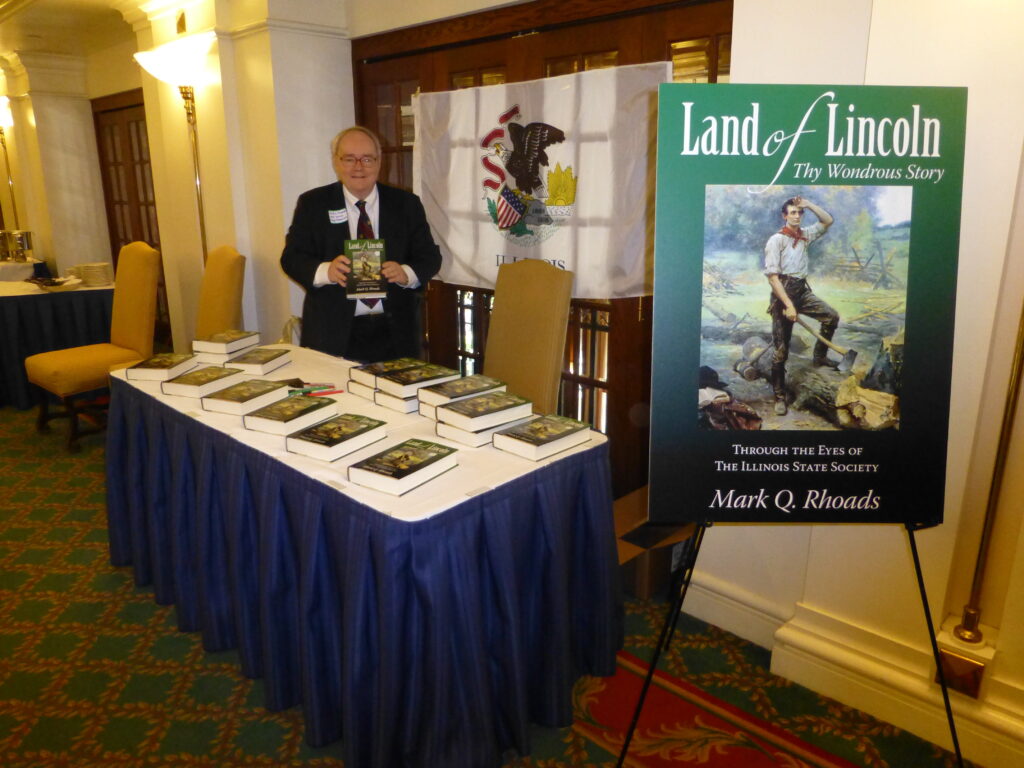On October 30th, former State Senator Mark Q. Rhoads, the author of Land of Lincoln, Thy Wondrous Story, was featured at Heartland Institute‘s ongoing author event series.
Rhoads was born in Hinsdale, Illinois and raised in Western Springs. He was elected to represent parts of Cook County and DuPage County in the Illinois State Senate in 1976 and reelected in 1980. In 1982, Rhoads taught as a Fellow of the Institute of Politics at the John F Kennedy School at Harvard University. As a visiting member of the Chicago Sun-Times editorial board from 1984 to 1987, Rhoads wrote more than three hundred editorials. His articles have appeared in The Wall Street Journal, The Washington Post, The Washington Times, Illinois Issues, Illinois Review and St. Louis Post-Dispatch, along with 250 appearances on radio and TV interview programs.
Rhoads’ new book is definitely a must read book not only for history buffs, but for all interested in the story of Illinois told in a unique way. Rhoads research includes information about Illinois history not covered in any other book.
Land of Lincoln ties together the historical connections which existed among a trio of cities with the founding of the Illinois State Society in Washington, D.C. in 1854 — Springfield, Chicago, and Washington, D.C. — through narratives gleaned from the 159-year-old Illinois State Society. These narratives cover important events in Illinois through the interactions of its political leaders with a generous sprinkling of humorous and anecdotal accounts of Illinois-bred notable personalities in the fields of arts, science, literature, business and sports.
The book also contains some never-before-published photographs of past Illinois leaders. Among the eight full pages is one photo that caught my attention: the late Chicago Sun-Times columnist Robert Novak of Joliet, accepting an award from Senator Carol Moseley Braun at the 1977 Illinois State Society Inaugural Gala.
The Illinois State Society of Washington, D.C. is the oldest state society. It has fondly been called Illinois’s “103rd county,” as it has served as a home away from home for Illinoisans of both political parties since 1854 and likewise for the nonpolitical living and working in Washington, D.C.
Rhoads’ unique perspective and access to pertinent historical anecdotes is partly due to his longtime involvement with the Illinois State Society in Washington DC. He was president of the Society from 1989 to 1990 and served on the Society’s board for twenty-seven years, from 1985 to 2012.
Rhoads begins his book’s narrative with an account in 1854, when the Illinois State Society was founded as the Illinois Democratic Club of Washington City. The group’s party affiliation was eventually dropped and the organization became simply known as The Illinois State Society.
Although Abraham Lincoln became president in 1861, Rhoads could not find proof that Lincoln was ever a member of the society. It was thought that most likely Lincoln didn’t have the time to be involved, since he was president during the tremulous time of the Civil War.
Rhoads told the Heartland audience his concern about the apparent deficit of knowledge that exists among students about their own state’s history. Texas alone requires the regular study of state history for high school graduation. Illinois has state history listed as part of its required curriculum, but no system of enforcement is in place.
Just as Rhoads enjoyed the study of American history through an understanding of how Illinois and its elected and non-elected leaders and celebrities shaped and enhanced the scheme of things in America’s political history, he believes school students will be more motivated to learn if they are taught in ways in which they can relate, rather than the typical uninspiring and boring timeline approach.
Illinois became the 21st state on December 3, 1818. Rhoads would like to coordinate Illinois teachers to celebrate Illinois’ 100th anniversary by having students recognize people of importance who came from their own home area. In so doing Rhoads hopes to foster an interest in state history, so the lives of those who built and guided the state over the years are celebrated by students throughout Illinois. Students must also be made aware that some of the problems Illinois is facing today are not new problems.
Illinois historical revelations noted by Rhoads in his first rate collection include:
- “Lonesome” George Gobel, who started out as a child star playing the guitar on WLS, which even in 1937 was an established major contributor to Chicago’s radio history.
- The Dawes family is virtually forgotten, yet it played an important part in the historical legacy of Illinois. Charles G. Dawes, 30th Vice President under President Calvin Coolidge, was from Evanston. His great, great grandfather had ridden with Paul Revere.
- Accusations of bribery which sent Governor Rod Blagojevich to jail happened in a big way 100 years ago, but Billy Lamar escaped punishment. This blatant bribery happening however, was the impetus that led to a change in our Constitution. Senators were no longer elected by legislators, but through state elections.
- The World Fairs of 1989 and 1933 were major events in Chicago. Planning for the 1933 World’s Fair, Chicago business leaders formed The Secret Six, knowing that Al Capone would be bad for tourism in a city still reeling from the St. Valentine’s Day massacre of 1932. The end result was a case brought against Al Capone for tax invasion. The city did feel safer. 39 million people visited the World Fair of 1933, which provided lasting benefits for Chicago.
- It was again question time when Rhoads asked who was in the stands as an eight year old boy on Oct. 1st, 1932, when Babe Ruth is said to have called the shots during game three of the 1932 World Series at Wrigley Field in Chicago. It was Chief Justice John Paul Stevens. This story was told to Mark Rhoads by a former president of the Illinois State Society, Virginia Blake, now 100 years old.
- Richard Sears and Alvah Roebuck met in Chicago and in 1893 founded a mail order catalogs which grew into Sears, Roebuck & Company. Noticing that the catalog of Montgomery Ward had no illustration, Sears and Roebuck took over the mail catalog business from Ward by adding illustrations. Chicago was ideally suited to the mail order business because of its transportation hub.
- James Kraft found someone to sell him a horse which enabled him to peddle wheels of cheese. The rest is history.
- Actor Harrison Ford is from Chicago; his wife is from Freeport, IL.
- Four presidents lived in Illinois: Abraham Lincoln, Ulysses S. Grant, Ronald Reagan, and Barack Obama.
- Jim and Marian Jordon, both born near Peoria, IL, became know as Fibber McGee and Molly. While in high school Jim Jordon played basketball with the late Bishop Fulton Sheen.
Rhoads ended his book with two presentation of “What ifs?” and then spoke of a thrifty Democrat governor.
If Governor Horner, first elected governor of Illinois in 1932, could be brought back, what would Gov. Horner have to say to Gov. Quinn if seated next to him at a table?
You might have it hard now, but look what I faced during a time of depression?
If Mayor Medill, mayor during the Great Chicago fire of Oct. 8, 1871, could be brought back, what would Mayor Medill have to say to Mayor Rahm Emanuel if he could engage Rahm in conversation?
You think you have it bad? I lost the entire city to fire, but it was rebuilt in 22 years.
Rhoads’ final thought was light-hearted in nature when he posed this question: Which Democratic governor behaved more like a Republican when he took office? It was Governor Henry Horner (Democrat) who in 1933 replaced Governor Louis Emmerson. Instead of discarding the stationary with Emmerson’s name on it, Governor Horner crossed out the name of Emmerson and wrote in his own.
Despite the many unpleasant, sleazy and darn right corrupt happenings that have peppered the history of Illinois, Rhoads still has hope for Illinois’ future. Why? Because each generation renews itself.
A free copy of Mark Rhoads’ book was placed on the desks of each legislator in the Illinois General Assembly in Springfield by Democratic House and Senate leaders, Madigan and Cullerton, respectively. Land of Lincoln, Thy Wondrous Story, was published in 2013 by Jameson Books, Ottawa, Illinois.
The next “Save the Date” Heartland Author event is scheduled for Thursday, November 14, when Dan Pilla will discuss,10 Principles of Federal Tax Policy.
*Watch the video of Mark Rhoads at the Heartland Institute’s Author Event at this link.
[Article originally published in the Illinois Review]





